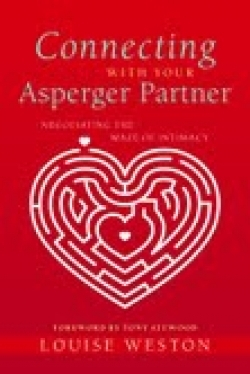Connecting with Your Asperger Partner
Negotiating the Maze of Intimacy
“The heart is deceitful above all things—who can know it?” muses the book of Jeremiah. Partners of people with Asperger’s Syndrome (AS) may find themselves asking the same thing. Facing what seems like endless frustration, meltdowns, and misunderstandings, the neurotypical partner (NT), or partner without Asperger’s, needs to learn new coping skills for communicating with an AS partner. Enter Louise Weston, RN and former coordinator of the Brisbane Asperger Partner’s Support Group in Queensland, Australia. Weston shares a wealth of knowledge—both professional and personal—to prepare the NT partner to negotiate the maze of the Asperger relationship.
Weston, whose husband has Asperger’s Syndrome, brings thoughtfulness to what could be a sterile, clinical subject. Asperger’s is a neurobiological condition that inhibits social understanding and the ability to have a reciprocal conversation; people with Asperger’s can be intensely interested in a particular subject, to the exclusion of other activities. The syndrome is often grouped with autism, though it is not the same thing. With support from their families and partners, “Aspies” can participate fully in life at all levels. Weston breaks down the syndrome from the NT partner’s point of view, introducing practical points. “You need to understand that their brain is wired differently,” she reminds the reader. “You must regain your identity.” She puts equal emphasis on supporting the AS partner and self-care for the NT partner.
Understanding that living with someone with Asperger’s can be draining for the NT partner, Weston proposes simple, common-sense techniques for having a productive conversation and avoiding conflict. This is not high-flown psychology, but compassionate awareness. For example, she reminds the reader to make sure she’s really paying attention. “You may think you’ve always listened effectively. Have you wondered why you have difficulty communicating with your Aspie? Why do they say, ‘you’re not listening to me?’ Is it because NTs are reading the signs of an impending meltdown and planning what to do, instead of actually paying attention and listening to what’s being said? It’s vital that you listen intently to your partner. Nodding and giving verbal feedback are some of the signs that show you’re paying attention.” Simple steps like making sure the TV is off and that the conversation takes precedence makes sure that the AS partner feels heard, as well as allowing the NT partner to feel safer, knowing that a meltdown is less likely to occur.
To supplement basic techniques, Weston includes more technical or clinical information, such as describing how the AS partner’s brain is wired and how that affects communication and attention. Several helpful flow charts show how a situation can elevate to a meltdown, and how to head off crises before they happen. Above all, Weston reminds the reader, “Give yourself permission to have an ‘imperfect’ relationship…Set your partner and yourself free from being the perfect couple in the perfect relationship.”
An invaluable resource for partners of people with Asperger’s Syndrome, Connecting With Your Asperger Partner is a thoughtful, hands-on, practical guide for the partner who’s not sure what to do next. Weston offers sound advice in a loving, knowledgeable tone that will give any reader the confidence to repair relationships and grow together in a healthy way.
Reviewed by
Claire Rudy Foster
Disclosure: This article is not an endorsement, but a review. The publisher of this book provided free copies of the book and paid a small fee to have their book reviewed by a professional reviewer. Foreword Reviews and Clarion Reviews make no guarantee that the publisher will receive a positive review. Foreword Magazine, Inc. is disclosing this in accordance with the Federal Trade Commission’s 16 CFR, Part 255.

